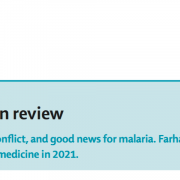7 days in healthcare (January 23rd-29th, 2023)

Summary
From the point of view of Biomedicine, it is worth highlighting, as the Nature article does, that among the 7 most promising technologies for 2023, at least three are directly related to biomedicine. It seems that not only neurons have a role in brain function, but also a relevant role of glial cells in certain disorders is beginning to be recognized.
As regards Global Health, the WHO requests 2.5 billion dollars to deal with health emergencies, particularly in Yemen, Afghanistan, Syria and Ethiopia.
As for International Health Policy, a consensus began to be created three years after the start of the pandemic that, although not totally overcome, it is no longer the emergency that it was. The problems in China with the covid continue. The crisis in the NHS is the biggest for many years. Basically, there are two positions: the one that seems to be held by the current conservative government that the system is unsustainable without co-payments and very profound changes; or the one represented by The Lancet, which says that the system is perfectly viable, if it is provided with more resources. What is clear is that the UK lags behind other European countries in many resources (hospital beds etc.). Two good news in terms of health policy are led by countries that are not usually at the forefront on these issues: the smoking ban in Mexico and the mental health law in Nigeria. Tensions between governments and pharmaceutical companies over the price of medicines are increasing and this time they are not only in Europe, but also in the United States (the largest pharmaceutical market).
If we talk about National Health Policy (Spain), the incidence of covid continues to drop, although mortality remains high (above 250 deaths per week). The medical conflict in public health continues, mainly in Primary Care. While there are communities that have reached agreements (Andalusia, Navarra, Aragon, Extremadura), in others (Madrid, Catalonia) there does not seem to be any sign of agreement, which makes us think and we will have to draw conclusions about different behaviors of the Administrations and of medical leaders. Conflict also between private health doctors and health insurers. It seems that the Equity Law is going ahead, after Darias’ agreement with Podemos. Interesting agreement in Madrid so that hospital specialists can also take leave. Aragon proposes that the issue of health be dealt with in the President’s Conference, which seems reasonable, given the seriousness of the problems, although the document of said community does not contain great innovative elements. After the more than debatable success of the operations in Alzira and Torrevieja, it seems that the Valencian government also wants to rescue Denia. At this point, a deeper and more articulate justification of political decisions should be demanded.
In the field of Companies, at the international level, it is necessary to highlight the great activity of private equity companies worldwide in the field of health, as revealed by the Bain report. In Spain, Ribera Salud leaves Extremadura. Important investments in our country from Bayer and Novartis are confirmed
Biomedicine
- Among the 7 technologies with the greatest impact in 2023, according to Nature, at least three of them directly related to biomedicine: single-molecule protein sequencing, CRISPR, and single-cell metabolomics (https://www.nature.com/articles/d41586-023-00178-y)
- Neurons are not the only cells that can “think”, glial cells (microglia, oligodendrocytes and astrocytes) are also related to multiple disorders (https://www.economist.com/science-and-technology/2023/01/23/neurons-are-not-the-only-brain-cells-that-think)
- The NHS begins to treat sleep apnea with an innovative chest implantable device (https://www.theguardian.com/society/2023/jan/28/nhs-begins-treating-sleep-apnoea-with-pioneering-chest-implant)
- An experimental agent slows the growth of glioblastoma, the findings are published in Science Translational Medicine (https://www.diariomedico.com/medicina/oncologia/un-agente-experimental-retrasa-el-growth-del-glioblastoma.html)
Global Health
- A vaccine is developed against Marburg disease, a rare disease that affects Europe, with high mortality (https://www.thelancet.com/journals/lancet/article/PIIS0140-6736(23)00169-1/fulltext?rss=yes)
- The WHO requests 2,500 million dollars to face the health emergency, especially in Yemen, Afghanistan, Syria and Ethiopia (https://www.plantadoce.com/entorno/la-oms-pide-2500-millones-de-dollars-to-cope-with-health-emergencies.html)
International Health Policy
- COVID
- Three years later, are we facing the end of the pandemic? It seems that the covid is no longer the emergency it was (https://elpais.com/sociedad/2023-01-28/tres-anos-despues-estamos-ante-el-final-de-la-pandemia.html)
- The WHO assesses whether covid 19 continues to be a “global emergency” (https://www.epe.es/es/sanidad/20230124/oms-covid-19-sigue-siendo-emergencia-global-81867486)
- Study shows persistent covid puts many people out of work (https://www.nytimes.com/2023/01/24/health/long-covid-work.html)
- Changes in the United States
- New regulations ease restrictions for gay and bisexual blood donors (https://www.nytimes.com/2023/01/27/health/blood-donation-gay-bisexual.html)
- China
- Rural China runs out of covid medicines (https://www.ft.com/content/af37022e-d8ea-48ef-8cdd-0f1ce99b6b65)
- China arrests protesters in front of zero covid policy (https://www.nytimes.com/2023/01/26/world/asia/china-protests-arrests.html)
- China’s policy on drug prices prevents biotech profits (https://www.ft.com/content/be0c2ec4-f0c3-411c-81d0-86d20058722c)
- Serious NHS crisis in the UK
- The Lancet Editorial: The NHS, sick but treatable. It says the current government thinks the current NHS is unsustainable without co-pays, which The Lancet says is wrong (https://www.thelancet.com/journals/lancet/article/PIIS0140-6736(23)00164-2/fulltext)
- Innovative solutions to repair the NHS (https://www.bmj.com/content/380/bmj.p187)
- The UK has fewer hospital beds per population than any developed country (https://www.economist.com/britain/2023/01/26/britain-has-fewer-hospital-beds-than-almost-any-other-rich-country)
- Lack of clinical academics threatens the NHS (https://www.ft.com/content/b5b9fe7f-7169-4ae6-a97b-cd98fe346ffe)
- 350,000 patients waited more than 12 hours in the ER before getting a bed (The Guardian)
- Health, at the center of politics in France
- France: surprising growth in obesity. Between 1997 and 2020, the proportion of obese people in France rose to 17%, although below the United States (40%), Mexico (33%) or the United Kingdom (26%) (https://www.economist.com/europe/2023/01/26/france-sees-a-surprising-surge-in-obesity)
- Mexico
- The first country to ban smoking in public, including hotels and beaches. Public health experts welcome the measure (https://www.bbc.com/news/world-latin-america-64279351)
- Nigeria
- A new Mental Health Law is approved, which has been very well received by mental health professionals (https://www.thelancet.com/journals/lancet/article/PIIS0140-6736(23)00165-4/fulltext)
- Pharmaceutical policy
- A dilemma for governments, how to pay for very expensive drugs (https://www.nytimes.com/2023/01/24/health/gene-therapies-cost-zolgensma.html)
- The war between pharmaceutical companies and governments over the price of medicines intensifies (https://www.ft.com/content/f77cac8c-9c75-4c77-9d63-d3d5c1c3965b)
- European Union
- Shortages of certain medicines: the first responses from the EU (https://www.lemonde.fr/economie/article/2023/01/24/penurie-de-medicaments-les-premieres-reponses-de-l-union-europeenne_6159056_3234.html)
- The long road towards the European Health Union (https://gacetamedica.com/politica/el-largo-camino-hacia-una-union-europea-de-la-salud/)
National health policy
- COVID
- The incidence drops to 67.58 points (over 60 years of age). If the population as a whole is taken, the cumulative incidence at 7 days is 26.02 cases. 251 deaths since the previous week. Still 2,341 patients admitted for covid, of which 177 in the ICU (https://www.consalud.es/pacientes/especial-coronavirus/datos-covid-espana_125605_102.html)
- Darias announces the end of masks on public transport for February 8 (https://www.elmundo.es/ciencia-y-salud/salud/2023/01/26/63d26d4be4d4d831758b459a.html)
- Medical conflict in public health
- There is no progress in the medical conflict in Madrid (https://www.epe.es/es/sanidad/20230124/sanidad-madrid-medicos-81846223)
- A tide of white coats floods Barcelona in defense of public healthcare (https://www.elperiodico.com/es/sanidad/20230125/marea-batas-blancas-medicos-cataluna-huelga-81942660)
- The medical strike continues in Catalan healthcare, without an agreement (https://elpais.com/espana/catalunya/2023-01-24/los-medicos-catalanes-confirman-la-huelga-para-este-miercoles-y-Thursday-after-not-reaching-an-agreement.html)
- Called off the Primary Care strike in Andalusia (https://www.redaccionmedica.com/autonomias/andalucia/acuerdo-para-desconvocar-la-huelga-de-atencion-primaria-en-andalucia–9295)
- Doctors in Extremadura call off the strike after reaching an agreement (https://www.epe.es/es/sanidad/20230123/desconvocada-huelga-medicos-extremadura-acuerdo-81787900)
- The meeting with Salud in Navarra, positive for calling off the strike (https://www.consalud.es/autonomias/navarra/reunion-con-gobierno-navarra-es-primer-avance-desconvacar-huelga-medicos_125589_102.html)
- Regulatory framework
- Darias agrees with Podemos to go ahead with the Equity Law (https://www.epe.es/es/politica/20230128/darias-podemos-ley-blinda-sanidad-publica-82091292)
- Public healthcare
- Surgical waiting lists, down in 2023 (https://www.redaccionmedica.com/secciones/sanidad-hoy/la-sanidad-publica-inicia-2023-con-tendencia-a-la-baja-en-waiting-lists-2624)
- Aragon wants to raise the debate on public health to the Conference of Presidents (https://gacetamedica.com/politica/aragon-plantea-elevar-el-debate-sobre-el-sns-a-la-conferencia-de-presidents-and-the-interterritorial/)
- Madrid will allow hospital care physicians to give labour leaves (https://www.consalud.es/autonomias/c-madrid/madrid-sistema-permitira-tramitar-bajas-medicas-facultativos-hospitalaria_125539_102.html)
- The oncology machines donated by Amancio Ortega will not work until 2026 (https://www.eleconomista.es/salud/noticias/12126197/01/23/Las-maquinas-oncologicas-que-dono-Ortega-no-funcionaran-hasta-2026.html)
- The Valencian government initiates the rescue of Denia, despite the poor results in Alzira and Torrevieja (https://www.vozpopuli.com/espana/comunidad-valenciana/gobierno-puig-inicia-rescate-hospital-denia-fiasco-alzira-torrevieja.html)
- Mental health
- Suicides have been growing in Spain since 2018 and the pandemic has aggravated it (https://elpais.com/salud-y-bienestar/2023-01-26/los-suicidios-crecen-en-espana-desde-2018-y-the-pandemic-aggravated-the-problem.html)
- Medical conflict in private healthcare
- Private healthcare doctors describe their demonstration in Seville as historic (https://www.epe.es/es/sanidad/20230123/medicos-sanidad-privada-historica-protesta-dignificacion-profesion-sevilla-81774218)
- Pharmaceutical policy
- Spain fines six pharmaceutical companies for failing to produce essential medicines (https://theobjective.com/sociedad/2023-01-29/farmaceuticas-multa-desabastamiento-medicamentos/)
- Biosim transfers to the Ministry its approaches to create a competitive market in biosimilars (https://diariofarma.com/2023/01/27/biosim-traslada-a-sanidad-sus-propuestas-para-crear-un-mercado-competitivo-del-biosimilar)
Companies
- International News
- Venture capital is committed to health and registers 400 operations in 2022, according to a Bain report (https://www.plantadoce.com/entorno/el-capital-riesgo-apuesta-por-la-salud-y-registra-400-operations-in-2022.html)
- RQ Bio partners with AstraZeneca to develop a covid antibody (https://www.ft.com/content/af9174df-2d5d-4452-ba91-bf1ab1714f1a)
- National News
- Atrys Health commits to Mexico with the opening of two new centers (https://www.plantadoce.com/empresa/atrys-health-apuesta-por-mexico-con-la-apertura-de-dos-nuevos-centros.html)
- Bayer closes the expansion plan of its plant in Alcalá, by investing more than 60 million (https://www.plantadoce.com/empresa/bayer-cierra-el-plan-de-expansion-de-su-planta-de-alcala-after-investing-more-than-60-millions.html)
- Novartis chooses Spain as the base to develop its nuclear medicine (https://www.eleconomista.es/salud/noticias/12117110/01/23/Novartis-elige-a-Espana-como-base-para-desarrollar-su-nuclear-medicine.html)
- Ribera Salud leaves Extremadura (https://www.extremadura7dias.com/noticia/ribera-salud-abandona-extremadura)
- Policlínica, a Balearic operator, aims for 37 million euros in revenue, 6% more than in 2022 (https://www.plantadoce.com/empresa/policlinica-apunta-a-37-millones-de-euros-in-income-in-2022-a-6-more.html)





